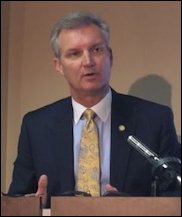by James A. Bacon
Having spent $300 million on the U.S. 460 upgrade between Petersburg and Suffolk, the state is suspending contract and permit work on the project until a critical environmental review by the Army Corps of Engineers can be completed. Secretary of Transportation Aubrey Layne made the announcement yesterday.
The Corps has given repeated warnings that it might not be able to issue the necessary permits for the 55-mile project, which, according to Southern Environmental Law Center attorney Trip Pollard, “would destroy more wetlands than any other project in Virginia since the Clean Water Act was enacted in 1972.”
The McDonnell administration had bulldozed the $1.4 billion project forward with full knowledge of the Corps’ concerns. The state has been paying US 460 Mobility, it’s public-private partner, $20 million a month as a “mobilization fee,” according to the Times-Dispatch. It was not clear from press accounts what that mobilization fee was paying for.
“How can you spend close to $300 million of the taxpayers’ money on a project where you don’t even have a shovel of dirt turned, no right of way purchased and don’t have a permit in hand?” Del. S. Chris Jones, R-Suffolk, head of the House Appropriations Committee told the Times-Dispatch.
“I was speechless,” Jones said. “The way it appeared to have been done, the fact that we were at risk, and that we were paying them a fixed fee every month — and they were getting paid without permits,” he added. “I just have never heard of it.”
If you’re looking for a scandal in the McDonnell administration, this is it. As I have long maintained, the focus on former Governor Bob McDonnell’s ethical lapses in his dealings with Star Scientific CEO Jonnie Williams Sr. were purely penny ante. What really needed scrutiny was the administration’s policy of funding mega-projects costing in the multiples of hundreds of millions of dollars, including the Charlottesville Bypass. Virginia’s press corps focused on the shiny bauble while ignoring the dusty chest loaded with treasure.
Layne, a vocal backer of the project while serving on the Commonwealth Transportation Board under McDonnell, said the state had temporarily halted permitting work and suspended the contract with US 460 Mobility Partners. According to the Virginian-Pilot, he said the state is more likely to improve the existing U.S. 460 by adding bypasses and bridges — an alternative that had been ruled out previously. The McAuliffe administration, he said, remains committed to improving the corridor.
This extraordinary development raises fundamental questions about the way transportation policy in Virginia is determined. In theory, the Commonwealth Transportation Board (CTB) exercises independent judgment over projects like this, but board members, including Layne, never provided any pushback against McDonnell’s forceful transportation secretary Sean Connaughton. Basic questions about the viability of the project went un-asked. In an in-depth piece I wrote about the role of the CTB in January 2013, I asked, “Who really establishes transportation policy for Virginia, the Commonwealth Transportation Board or the McDonnell administration?” Even before the environmental-permitting issues had arisen, I wrote:
Not a single board member voted against allocating $1.4 billion, including roughly $1 billion in public funds, to the U.S. 460 connector between Suffolk and Petersburg — even though increased traffic on the highway is not expected to materialize for years and the economic return on investment is predicated upon the proposition that massive industrial development will occur in the U.S. 460 corridor.
For that article, I asked Layne if the CTB were a rubber stamp. He told me: “I don’t consider myself a rubber stamp. I ask questions. I go through the agenda a week in advance. I get on the phone and ask questions. … I don’t see how I could make an intelligent vote on something without doing it.”
His perspective has changed. “I’m much more informed than I was a year ago as a CTB member,” Layne told the Pilot yesterday.
While the McAuliffe administration tries to fix the mess it inherited from its predecessor, the General Assembly needs to give serious thought to a higher-level issue: how to reform the CTB. Virginians need a board that asks the kind of tough questions that the CTB simply isn’t accustomed to asking.



